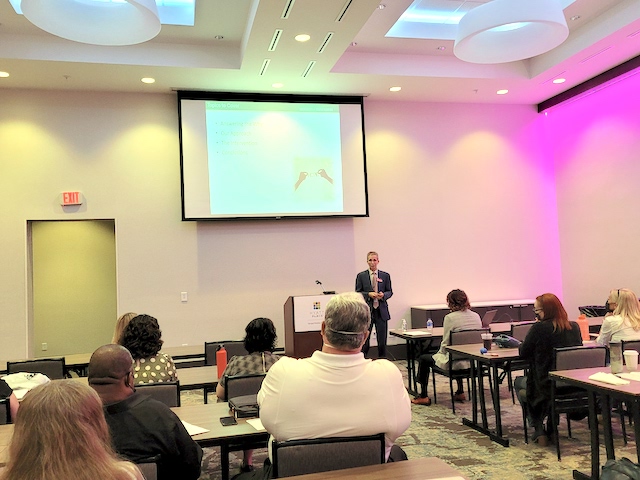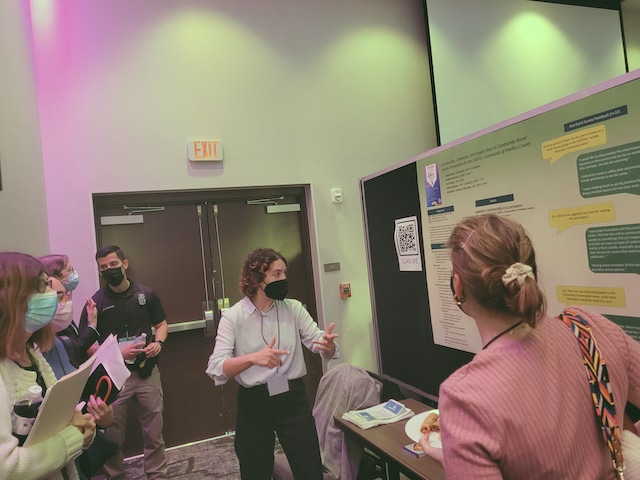COPHers strive to reduce suicides by “Growing Hope”
It’s not hard to see how suicide is a public health issue. According to the Centers for Disease Control and Prevention (CDC), one person dies by suicide every 11 minutes in this country. Suicide is one of the leading causes of death in the U.S., and certain groups, including young people, seniors, veterans and those in the LGBTQ+ community, are at particularly high risk.
Stemming Suicides with Outreach
To help stem suicides among vulnerable populations in the area, Dr. Joe Bohn, a USF College of Public Health (COPH) assistant professor and director of community engagement, teamed with students, faculty and community partners to begin a series of outreach events (e.g., virtual and in-person town hall meetings, coffee socials, etc.) for the suicide-prevention group Zero Suicide Partners of Pinellas.
Zero Suicide Partners Pinellas works with area behavioral specialists, health providers, schools, government and community partners to help prevent suicides.

The series has been coined the Growing Hope project.
“Last summer, I was participating in meetings for the Zero Suicide Partners of Pinellas and I asked what was being done in terms of community outreach,” Bohn said. “Nothing had been started, so I made a pitch for building an outreach program based on four vulnerable populations of focus—youth, LGBTQ+, veterans and seniors. The chair and community partners liked the idea, so we started planning last fall. We held our first event in November as a virtual town hall for the LGBTQ+ community and our second one for youth was in person in April.”
Bohn teamed with the COPH’s Harrell Center and its director, Dr. Abraham Salinas-Miranda, to plan for data collection for the intervention. He was also joined in the effort by doctoral student Kelli Agrawal and MPH student Alexandria O’Connell.
Growing Hope aims to increase awareness of available resources and engage with community partners and subject matter experts to deepen connections and community resiliency.

“Originally, I thought I would just be helping with the Institutional Review Board (IRB) proposal,” Agrawal said. “However, once I started attending the planning meetings, I became really interested in the Growing Hope project. I love that the focus is on community, connection and strengths-based approaches to suicide prevention. This really aligns with my interests in mental health, resilience and community-engaged research.”
O’Connell was the moderator for the last town hall on youth and suicide, attended by about 80, including 10 youth participants.
“We were able to get the youth perspective as well as the family and provider perspective,” O’Connell noted. “By sharing these experiences, you see the diversity and the underlying threads. It helps give kids and families a place to start to have conversations.”
One of the goals of the town halls is the development of what Bohn calls a “web of hope,” which he defines as “a self-sustaining and interwoven organic network of resources spanning all levels, from individuals to family to organizations and communities. It’s an idea still in its infancy,” Bohn said, “but I envision it tapping into people, processes, policies and technology. The idea is to reach the people with the greatest need who are not connected.”

Compassion, Connection, Conversation
In addition to their work with the town halls, both Agrawal and O’Connell recently presented posters on suicide prevention.
O’Connell used information gleaned from the LGBTQ+ Growing Hope town hall to develop a poster presentation entitled, “Compassion, Connection, and Equity: Keys to Community-Based Suicide Prevention for the LGBTQ+ Community of Pinellas County.”
The poster was compiled with the help of Drs. Bohn and Salinas-Miranda, Agrawal and Kristin Mathre, a family therapist, chair for the Zero Suicide Partners Pinellas and COO of Suncoast Center, a Pinellas County center offering behavioral health, substance abuse and other social support services. It explored the suicide risk factors the LGBTQ+ community faces as well as some protective measures, such as having LGBTQ+ allies in the schools.
“What we found from the research is we have to take a more targeted, narrow approach when it comes to the LGBTQ+ community and suicide,” O’Connell reported. “The LGBTQ+ community encompasses a broad spectrum of people. For example, gay people over 65 who have lived through the AIDS crisis have different needs and perspectives than a young trans person might.”

Agrawal’s poster, “Speaking Into Being: Examining the Role of Communicative Resilience in LGBTQ+ Suicide Prevention,” which used data collected from the LGBTQ+ suicide prevention town hall, was recently presented at the USF Graduate Student Research Symposium, held in March.
According to Agrawal, participants expressed the importance of peer and professional support, affirming identities, reducing stigma and normalizing kindness, among other things.
“We learned that communication that supports connection, compassion, hope, equity and empathy can enact resiliency in the LGBTQ+ community and help prevent suicides,” Agrawal said.
Next Steps
Bohn and his team are planning for the next town hall (to be held virtually on June 14) and upcoming in-person meetings including a series of veterans’ coffee socials and others, yet to be scheduled.
“The best thing we can do is to continue working to get community partners together to help drive more outreach. For youth, you have to get information out to parents and guardians. For other vulnerable populations, you want to look at social media distribution through groups and other personalized connection pathways,” Bohn said. “I think what’s important is extending our network through tailored channels where people know others with special or common interests.”
Story by Donna Campisano, USF College of Public Health
